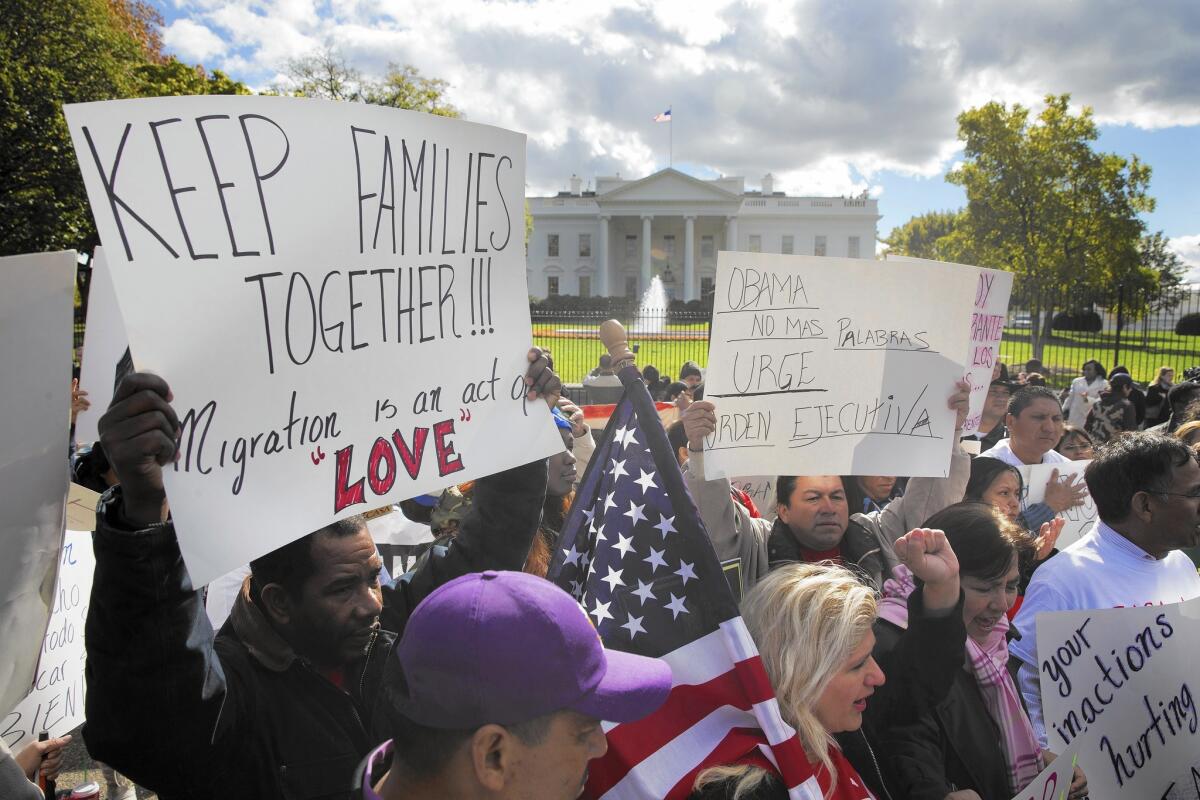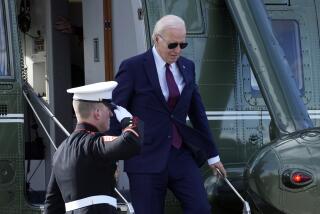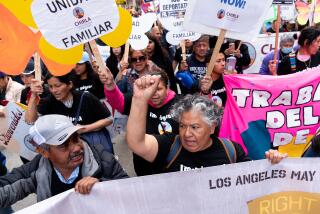Going solo on immigration: Obama weighs reform options

Shortly before President Obama left for Asia last weekend, aides gave him an ambitious list of potential actions he can order to change enforcement of immigration laws without congressional approval.
Senior aides will give Obama their final recommendations as early as Tuesday. He could make his decision — and unveil the orders — soon after, although no date has been set.
He may decide to ease the threat of deportation for as many as 5 million foreigners who are in the country illegally.
Whatever he decides is likely to enrage Republicans, who warned after they swept last week’s midterm election that any executive action on immigration would spoil chances for cooperation with the new GOP-led Congress.
The package of reforms under consideration is likely to touch many parts of the immigration system.
They include an increase in visas for technology workers and their families, new instructions on who should be detained for violating immigration laws, and pay raises for immigration officers, according to two senior administration officials who spoke on condition of anonymity about the internal deliberations.
The biggest impact would be from a program that could allow some of the estimated 11 million people in the country illegally to come forward, pay a fee and submit to a background check in exchange for a potential work permit and a temporary reprieve from deportation, the officials said.
That initiative would be similar to the Deferred Action for Childhood Arrivals program that Obama created in 2012.
Under that program, officials have issued work permits to more than 680,000 people who were brought to the country illegally as children. Those approved are protected from deportation for two years, and can apply for extensions.
Obama is still deciding how far to expand the deferred action program.
Some aides are pushing him to include parents of children who are U.S. citizens, as well as parents of DACA recipients who have been in the country for several years. If Obama agrees, as many as 5 million people could be eligible to apply under those two categories.
But that number could shrink if other requirements, such as proof of a 10-year presence in the U.S., are added.
About 400,000 people have been expelled each year since Obama took office in 2009. The record figures follow hiring initiated under President George W. Bush that has nearly doubled the size of the Border Patrol since 2004.
Obama “has a tough enforcement record and a successful DACA program, and he’s at a crossroads” on the next step, said Angela Kelley, an immigration expert at the Center for American Progress, a Washington think tank with close ties to the White House.
If his orders are “small potatoes and our deportation policies are basically intact and will continue for another two years, that is what will dominate” his legacy with Latinos, she said.
Republican lawmakers have said they would cut funding if Obama goes around Congress.
Sen. Jeff Sessions (R-Ala.) threatened this week to defund any executive action on immigration. Sessions, who has been a consistent critic of Obama’s immigration policy, is on tap to head the Senate Budget Committee when Republicans take control in January.
House Speaker John A. Boehner (R-Ohio) told reporters Thursday he would oppose executive action on immigration.
“We’re going to fight the president tooth and nail if he continues down this path,” he said. “This is the wrong way to govern. This is exactly what the American people said on election day they didn’t want.”
Most of the costs of processing the DACA program are covered by fees paid by those who apply, not with money from Congress.
Some administration advisors, however, have expressed concern about the government’s ability to implement a program that involves millions of applications. Administration lawyers worry that the more people an executive action includes, the more vulnerable it is to legal challenges.
In his news conference a day after the midterm election, Obama showed no sign of backing down.
“Before the end of the year, we’re going to take whatever lawful actions that I can take that I believe will improve the functioning of our immigration system,” Obama said. “What I’m not going to do is just wait.”
Obama said if Republicans in Congress didn’t like him acting on his own, they could pass an immigration bill that replaced his executive actions. He returns Sunday from an eight-day trip to China, Myanmar and Australia.
Twitter: @ByBrianBennett
More to Read
Start your day right
Sign up for Essential California for news, features and recommendations from the L.A. Times and beyond in your inbox six days a week.
You may occasionally receive promotional content from the Los Angeles Times.







